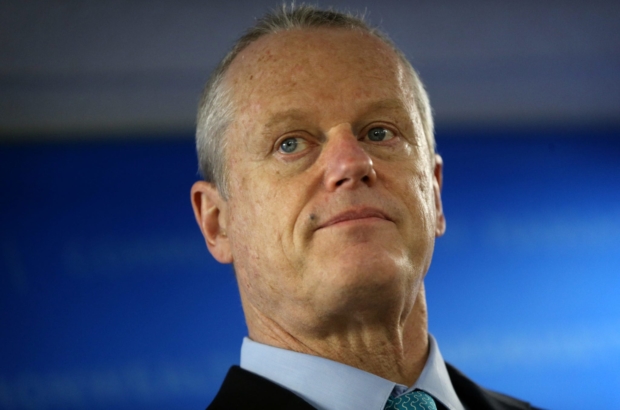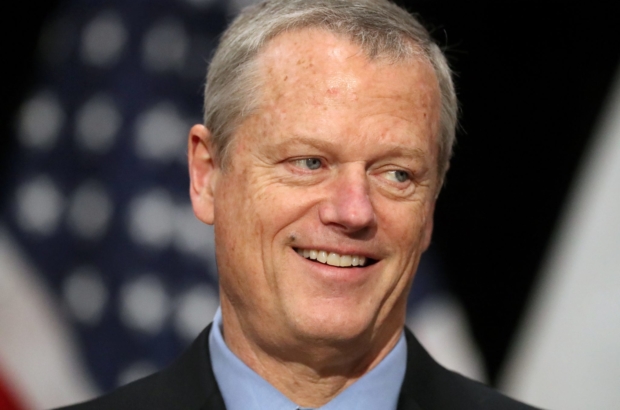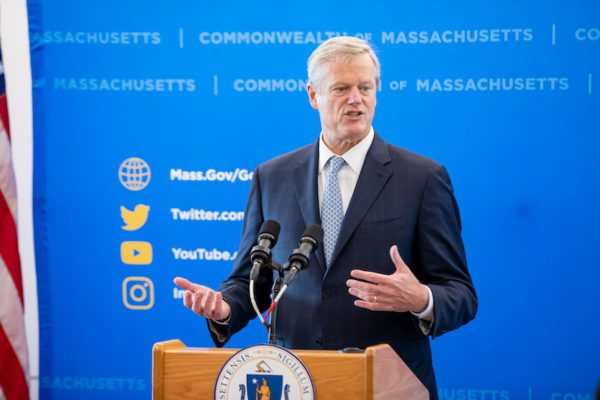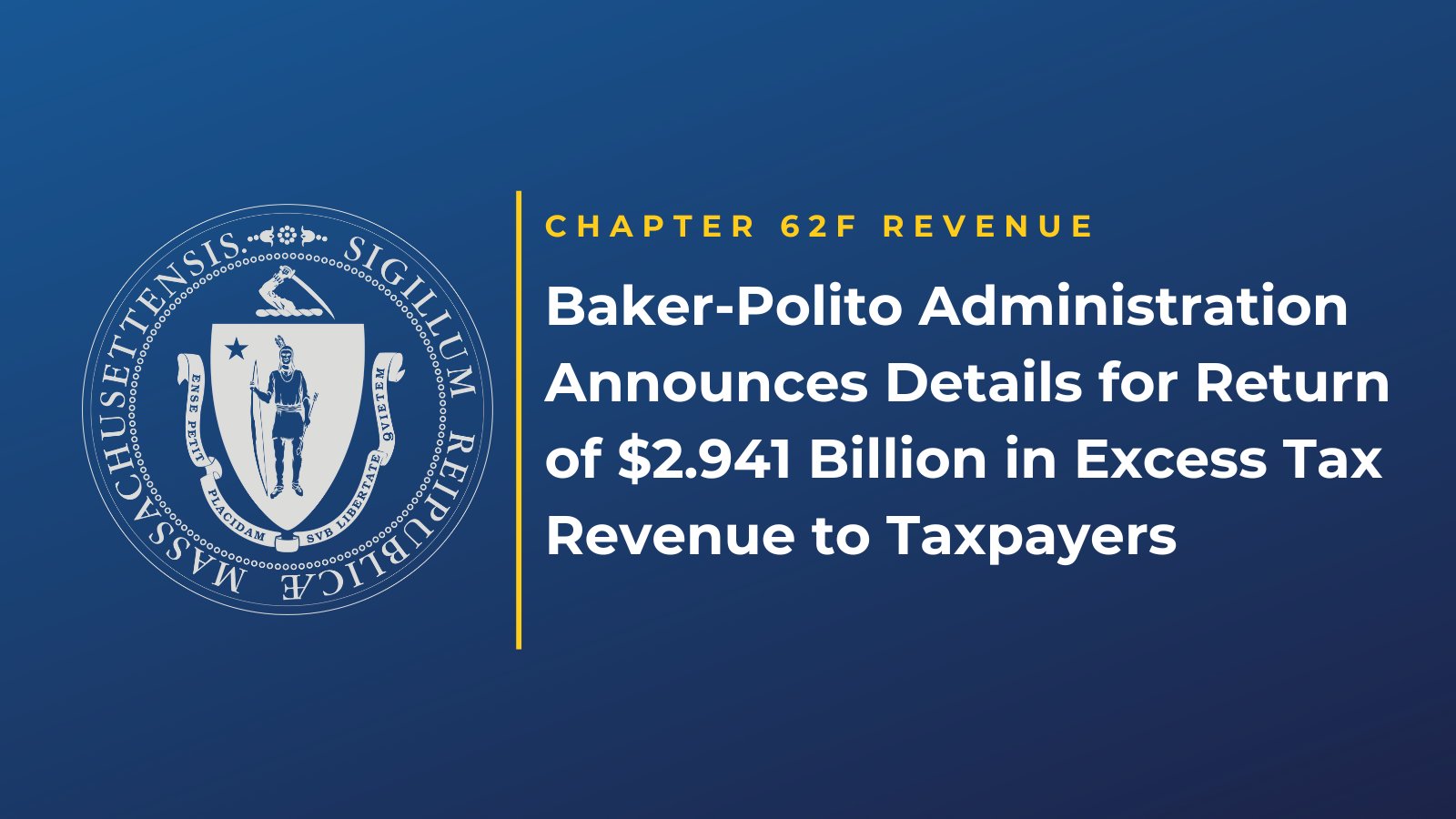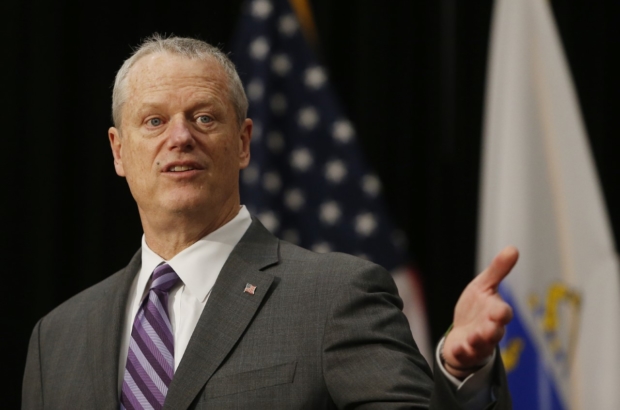Law will further equitable access to mental health care for residents
Today (08/16/2022), legislative leaders and advocates joined Governor Baker for the ceremonial bill signing of the Mental Health ABC Act: Addressing Barriers to Care, comprehensive legislation to continue the process of reforming the way mental health care is delivered in Massachusetts, with the goal of ensuring that people get the mental health care they need when they need it. The Governor officially signed this legislation into law on August 10, 2022.
The Mental Health ABC Act is driven by the recognition that mental health is as important as physical health for every resident of the Commonwealth and should be treated as such. The legislation includes a wide variety of reforms to ensure equitable access to mental health care and remove barriers to care by supporting the behavioral health workforce.
"One moment, many years ago, I made the split-second decision to share the story of my family's struggle with mental illness—a moment of vulnerability and honesty that has become a movement, as more and more people stand up and speak up for accessible, high quality mental health care," stated Senate President Karen E. Spilka (D-Ashland). "We all deserve to have access to the mental health care we need, when we need it, and I am thrilled to see comprehensive mental and behavioral health care reform signed into law. I'd like to thank my colleagues in the Senate—especially Senators Cyr and Friedman—Speaker Mariano and our partners in the House, and Governor Baker, as well as the countless individuals, families, advocates, providers and others who have stood up for the idea that mental health is just as important as physical health, and to everyone who has fought for mental health care reform in Massachusetts and never gave up."
"Simply put, this legislation will move us closer to treating mental and physical health equally, as it builds upon our long-standing efforts to improve our behavioral health care delivery system," said House Speaker Ronald J. Mariano (D-Quincy). "I'm incredibly proud of the fact that this legislation will help to address the behavioral health crisis that so many of our residents are currently experiencing, especially young people. I want to thank my colleagues in the House, Senate President Spilka and our partners in the Senate, and Governor Baker for prioritizing increased support for the Commonwealth's mental health infrastructure."
"Today's ceremonial bill signing signifies a vital stride toward transforming mental health care in Massachusetts," said Senator Julian Cyr (D-Truro), Senate of the Joint Committee on Mental Health, Substance Use and Recovery. "By signing the Mental Health ABC Act into law, we codify and affirm that mental health is just as essential as physical health and take a leap forward to ensure that all people in Massachusetts can access the mental health care they need and deserve. I am deeply grateful to Senate President Karen Spilka for her leadership and example, to Senators Friedman, Rodrigues, and Tarr for their efforts in this most urgent endeavor, and to Representative Madaro for his partnership."
"Too many people in communities across the Commonwealth struggle to get the mental, emotional and behavioral health care they deserve," said Representative Adrian C. Madaro (D-Boston), House Chair of the Joint Committee on Mental Health, Substance Use and Recovery. "This legislation helps reduce barriers to resources, support, and treatment residents need for their overall wellbeing. It enables enforcement of existing parity laws, enhances emergency response services and acute psychiatric care, develops programs to strengthen the workforce, and invests in mental health. Importantly, our legislation also creates initiatives to address the unique mental health needs of young people. This legislation is the first step in addressing the structural deficits in our mental health care delivery system by prioritizing the people it serves and the people who make it work."
"The health care system in Massachusetts is only as strong as its weakest link, and for far too long, mental health care has been overlooked and underfunded," stated Senator Cindy F. Friedman (D-Arlington), Senate Chair of the Joint Committee on Health Care Financing. "This law confronts this reality with the most comprehensive mental health care action the Commonwealth has seen in recent years, and it builds off of the historic investments we made in this care system over this past two-year legislative session. Of particular importance to me, this bill will finally provide the state the tools it needs to enforce existing mental health parity laws and it will address the emergency department boarding crisis that is impacting too many of our children and their families. I have long believed that Massachusetts should deliver affordable, high quality, and accessible care to its residents, and this includes mental health care."
"With this legislation, the House and Senate make an important investment in mental health care—and in the mental and behavioral health workforce," said Representative Denise C. Garlick (D-Needham), Chair of the House Committee on Bills in the Third Reading. "Every aspect of this bill is rooted in the fact that we support and strengthen health care workers through a focus on health equity, equitable reimbursement, and supporting those who support providers. Every resident will benefit from a stronger workforce providing care."
"This bill takes major and necessary steps to advance and strengthen the delivery of mental health care in our Commonwealth, by securing parity with physical health care, moving pediatric mental health patients expeditiously from emergency departments to more appropriate treatment settings. I am pleased that amendments that I offered to address mental health needs of police, firefighters, EMTs, and other first-responders are included as well as the requirement that online portals with updated information and resource will be available in real-time," said Senate Minority Leader Bruce Tarr (R- Gloucester), a member of the conference committee. "These and other components of the bill make the identification and treatment of mental health in our Commonwealth stronger, better, and more effective so that people in need of care can better access essential resources in the right place and provided by the right people."
"This legislation is a sea-change, greatly improving access to mental and behavioral health services and addressing some of the most challenging aspects of delivering this critical health care to all," stated Representative Hannah Kane (R-Shrewsbury). "Far too many families have seen loved ones suffering and unable to access the short and long term care they need to get well and be well, my family included. I am grateful for the work of the conferees and the leadership of the Legislature."
The following are features of The Mental Health ABC Act:
- Guaranteeing Annual Mental Health Wellness Exams. This law mandates insurance coverage for an annual mental health wellness exam, comparable to an annual physical.
- Enforcing Mental Health Parity Laws. This law provides the state with better tools to implement and enforce parity laws by creating a clear structure for state agencies to receive and investigate parity complaints and ensure their timely resolution.
- Initiatives to Address Emergency Department Boarding. This law creates online portals that provide access to real-time data on youth and adults seeking mental health and substance use services and includes a search function that allows health care providers to easily search and find open beds using several criteria; requires the Health Policy Commission (HPC) to prepare and publish a report every three years on the status of pediatric behavioral health as the youth boarding crisis is particularly acute; requires the Center for Health Information and Analysis (CHIA) to report on behavioral health needs; updates the expedited psychiatric inpatient admissions (EPIA) protocol and creates an expedited evaluation and stabilization process for patients under 18.
- 988 Implementation and 911 Expansion. This law increases access to on-demand behavioral health care through the implementation of the nationwide 988 hotline that will provide 24/7 suicide prevention and behavioral health crisis services and expands 911 to bridge the gap until 988 is implemented.
- Red Flag Laws and Extreme Risk Protection Orders. This law initiates a public awareness campaign on red flag laws and extreme risk protection orders (ERPOs) that limit access to guns for people at risk of hurting themselves or others.
- Reimbursing Mental Health Providers Equitably. The law requires an equitable rate floor for evaluation and management services that is consistent with primary care.
- Reforming Medical Necessity and Prior Authorization Requirements. This law mandates coverage and eliminates prior authorization for mental health acute treatment and stabilization services for adults and children and ensures that if a health insurance company intends to change its medical necessity guidelines, the new guidelines must be easily accessible by consumers on the health insurance company's website.
- Creating a Standard Release Form. This law directs the development of a standard release form for exchanging confidential mental health and substance use disorder information to facilitate access to treatment by patients with multiple health care providers.
- Increasing Access to Emergency Service Programs. The law requires health insurance companies to cover Emergency Service Programs (ESPs), community-based and recovery-oriented programs that provide behavioral health crisis assessment, intervention, and stabilization services for people with behavioral health needs.
- Expanding Access to the Evidence-Based Collaborative Care Model. The law expands access to psychiatric care by requiring the state-contracted and commercial health plans to cover mental health and substance use disorder benefits offered through the psychiatric collaborative care model.
- Reviewing the Role of Behavioral Health Managers. The law directs the Health Policy Commission (HPC), in consultation with the Division of Insurance (DOI), to study and provide updated data on the use of contracted behavioral health benefit managers by insurance carriers, often referred to as 'carve-outs.'
- Tracking and Analyzing Behavioral Health Expenditures. The law directs the Center for Health Information and Analysis (CHIA) to define and collect data on the delivery of behavioral health services to establish a baseline of current spending and directs the Health Policy Commission (HPC) to begin tracking behavioral health care expenditures as part of its annual cost trends hearings.
- Establishing an Office of Behavioral Health Promotion. The law establishes an Office of Behavioral Health Promotion within the Executive Office of Health and Human Services (EOHHS) to coordinate all state initiatives that promote mental, emotional, and behavioral health and wellness for residents.
- Increasing Access to Care in Geographically Isolated Areas. This law directs the Department of Mental Health (DMH) to consider factors that may present barriers to care—such as travel distance and access to transportation—when contracting for services in geographically isolated and rural communities.
- Enhancing School-based Behavioral Health Services and Programming. This law enhances school-based behavioral health supports, increases access points for effective behavioral health treatment by limiting the use of suspension and expulsion in all licensed early education and care programs and public schools, and creates a statewide technical assistance program to help schools implement school-based behavioral health services.
- Increasing Access Points for Youth for Effective Behavioral Health Treatment. The law requires behavioral health assessments and referrals for children entering the foster care system and establishes an interagency review team to ensure young people with complex behavioral health needs are assisted quickly and with cross-agency support and coordination.
- Expanding Insurance Coverage for Vulnerable Populations. This law ensures individuals over 26 years old who live with disabilities can remain on their parents' health insurance.
- Creating a Roadmap on Access to Culturally Competent Care. Under this provision, an interagency health equity team under the Office of Health Equity, working with an advisory council, will make annual recommendations for the next three years to improve access to, and the quality of, culturally competent mental health services. Paired with the Legislature's ARPA investment of $122 million in the behavioral health workforce through loan repayment assistance programs, this roadmap will make great strides toward building a robust workforce reflective of communities' needs.
- Allows for an Interim Licensure for Licensed Mental Health Counselors. The law creates an interim licensure level for Licensed Mental Health Counselors (LMHCs) so that they can be reimbursed by insurance for their services while obtaining supervised practice hours towards full licensure and be eligible for state and federal grant and loan forgiveness programs.
- Expanding Mental Health Billing. This law allows clinicians practicing under the supervision of a licensed professional and working towards independent licensure to practice in a clinic setting.
- Updating the Board of Registration of Social Workers. The law updates the membership of the Board of Registration of Social Workers to clarify that designees from the Department of Children and Families (DCF) and Department of Public Health (DPH) be licensed social workers.
"During a national mental health emergency, Massachusetts leaders in the Legislature, Administration, and healthcare community joined to craft, pass, and sign landmark legislation to address equitable access to behavioral health care in the Commonwealth," said Danna Mauch, President and CEO of the Massachusetts Association for Mental Health (MAMH). "MAMH applauds the pacesetting institution of universal payor participation in and coverage for annual mental wellness exams, 24/7 telephonic behavioral health help line, comprehensive crisis services, behavioral health urgent care, and collaborative care as part of roadmap for reform."
"The passage of An Act addressing barriers to care for mental health signals the Commonwealth's ongoing commitment to improving mental health care access and quality for Massachusetts residents," said Lydia Conley, President/CEO of the Association for Behavioral Healthcare (ABH). "This landmark law will help individuals experiencing a mental health crisis, reduce emergency eepartment boarding, and ensure that parity laws are followed and enforced. ABH is grateful for the continued leadership of the Senate, House, and Governor in driving forward important reforms with the urgency these issues demand."
"The collaboration between the Administration and the Legislature to pass the 2022 Mental Health law has been extraordinary," said Mary McGeown, Executive Director of the Massachusetts Society for the Prevention of Cruelty to Children (MSPCC). "This landmark law creates vital tools and strategies to help families, schools and communities respond to the current child mental health crisis and to address long standing gaps in access to care. As part of the leadership team of the Children's Mental Health Campaign, we are thrilled to see these meaningful reforms signed into law today."
"On behalf of the National Association of Social Workers - MA Chapter, we are thrilled this landmark mental health legislation has been signed into law," said Rebekah Gewirtz, Executive Director of NASW-MA. "We are especially encouraged that the new interagency health equity team will work to support a more diverse behavioral health workforce that represents communities served and that will better ensure culturally competent care. Passage of this law will go a long way to improving the quality of life for all Massachusetts residents at a time of such acute and pressing need for critical behavioral healthcare services."
"This is a groundbreaking day for mental healthcare in the Commonwealth," said Steve Walsh, President and CEO of the Massachusetts Health and Hospital Association. "Our hospitals and health systems applaud leaders in the Senate, House, and Baker Administration for making it possible. This law is grounded in systemic changes to guarantee long-promised parity, bolster the behavioral health workforce and—perhaps most critically—better address the mental health needs of children. Behavioral health has been a top priority of every healthcare organization in Massachusetts since before the pandemic began, and they remain deeply committed to ensuring that every community member has access to the resources and care they need."
"Access to quality mental health care has never been more important," said Dr. Sandhya Roa, Chief Medical Officer of Blue Cross Blue Shield of Massachusetts. "This legislation is the culmination of years of work by policymakers and stakeholders to reform the mental health delivery system across the Commonwealth. Blue Cross Blue Shield of Massachusetts applauds this thoughtful, evidence-based approach to increasing capacity, improving integration with physical care, and making targeted investments to better serve our residents."
"MAHP applauds the House and Senate for their collaboration and leadership in seeking to improve access to behavioral health care services and treatment. We thank bill sponsor Senate President Spilka for her dedication and leadership," said a statement from the Massachusetts Association of Health Plans (MAHP). "MAHP and our member health plans are pleased to see that the mental health ABC legislation includes important policy solutions to reduce emergency department boarding of patients seeking mental health and substance use disorder services, including codifying the expedited psychiatric inpatient admission process, and ensuring patients have timely access to the behavioral health care they need in the emergency department while in crisis. Our health plans are committed to providing high quality and comprehensive behavioral health benefits, in compliance with state and federal mental health parity laws. We look forward to working with the legislature next session to ensure that the entire health care system treats physical and behavioral health the same."
"On behalf of our patients, the physicians of the Massachusetts Medical Society extend our gratitude to Governor Baker, and we thank Senator Cyr and our legislators for their leadership in recognizing the importance and urgency surrounding this bill," said Dr. Theodore Calianos, President of the Massachusetts Medical Society. "The COVID-19 public health crisis amplified myriad challenges our patients face in accessing timely, high-quality, comprehensive mental health care, challenges that can be especially insurmountable for the most vulnerable residents of the Commonwealth. Provisions in this bill will empower patients and physicians to make decisions that will more often lead to optimal outcomes for those who need and seek mental health care."
"With the passage of the Mental Health ABC Act, we are at the dawn of a new day for mental health treatment in the Commonwealth," said Dr. Grace Chang, President of the Massachusetts Psychiatric Society. "We are now leading the nation in parity for mental health care just when it is most needed. MPS congratulates the Massachusetts legislature on its visionary measure and looks forward to assisting in its implementation."
Having been officially signed by the Governor on August 10, 2022 the Mental Health ABC Act is now law.


